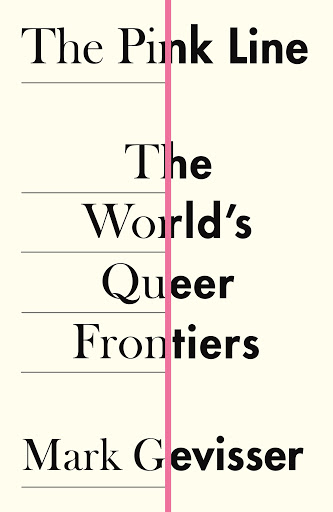 The Pink Line: The World’s Queer Frontiers
The Pink Line: The World’s Queer Frontiers
by Mark Gevisser
Profile Books
Born and raised in South Africa, Mark Gevisser has first-hand knowledge of Apartheid and, as a Yale-educated journalist, he has been able to write about people’s rights and how they are claimed, promoted or abused. One of the organizers of South Africa’s first Pride March in 1990, he is the co-author of Defiant Desire, about gay and lesbian lives in South Africa.
Gevisser married in 2009 after South Africa became the fifth country in the world to legalise same-sex marriage and was the first country to guarantee equality on the basis of sexual orientation. However, twenty kilometers away in Malawi, an engagement ceremony resulted in a sentence of 14 years with hard labour for one of the participants, and black working-class lesbians were subjected to ‘corrective rape’.
While same-sex marriage and gender affirmation was being celebrated in some countries, laws were being strengthened to criminalise such activities in other countries. So, for the last seven years, Gevisser has travelled the world trying to understand how the world is changing and what struggles are still on-going.
Visiting nine countries, he discovered twenty-first century stories from the other side of the ‘pink line’ that divides the world into haves and have-nots of the LGBT component of human rights. In 2013, the United Kingdom passed a bill to allow same-sex marriage while Nigeria officially announced a Same Sex Marriage (Prohibition) Act in the name of ‘traditional values’, ‘cultural sovereignty’ and ‘natural order’.
Gevisser’s research is deeply intimate and thorough as he documents people’s stories – from exiled Ugandan refugees to Egyptian activists struggling to hold onto love; from transgender women in Russia trying to see their children to transitioning teens in America’s Midwest.
In 2008, the French Human Rights Minister Rama Yade drew the first ‘pink line’ across the floor of the United Nations General Assembly when she introduced a declaration on behalf of the European Union condemning “violations of human rights and fundamental freedoms based on sexual orientation or gender identity”.
Sixty-six countries supported the declaration and fifty-seven signed a counter declaration, protesting that the move interfered illegally in their domestic affairs. Gevisser sees that criminal ignorance arising from prejudice and personal preconceptions means that it is impossible to estimate how many LGBT people have been affected by violence and discrimination.
Transgender issues have really come to the fore in this century and there has been a huge resistance to challenging the gender binary, even though some countries have had a third gender for centuries. Gevisser investigates many battles including those that have been fought on the sports field, in school toilets and in courts.
Gevisser’s research shows how quickly things have changed and moved away from norms that have defined cultures and families for centuries. In just one generation, the beginning of the twenty-first century has welcomed radically new ideas about what a family looks like, but also who has the right to make one.
This is a groundbreaking record of oral histories, collected and put into print by a dedicated journalist. It brings to light the lives and struggles of people who would not normally be able to tell the world of their suffering. It also gives readers a chance to look at their internal ‘pink lines’, their judgments and their empathy.
Lezly Herbert

Love OUTinPerth Campaign
Help support the publication of OUTinPerth by contributing to our
GoFundMe campaign.




